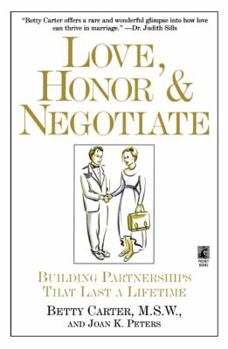Love Honor and Negotiate: Building Partnerships That Last a Lifetime
Select Format
Select Condition 
Book Overview
Through meaningful examples, Betty Carter's Love Honor and Negotiate demonstrates how to tailor marriages to fit the pressures of the real world. Family therapist Betty Carter's cutting-edge, common-sense approach to helping marriages flourish is based on the premise that couples today want to be equals, but the realities of the workplace force them into traditional roles, especially after they have children.
Format:Paperback
Language:English
ISBN:0671896253
ISBN13:9780671896256
Release Date:June 1997
Publisher:Atria Books
Length:352 Pages
Weight:1.05 lbs.
Dimensions:0.9" x 5.9" x 8.9"
Related Subjects
Domestic Life Health, Fitness & Dieting Health, Fitness & Dieting History & Criticism Interpersonal Relations Literary Criticism Literary Criticism & Collections Marriage Movements & Periods Parenting & Relationships Politics & Social Sciences Psychology Psychology & Counseling Relationships Women's FictionCustomer Reviews
5 ratings
Very helpful book
Published by Nicole , 3 years ago
I LOVE this book! My favorite chapter is 4. Chapter 5 is also amazing! Overall a very impressive book.
I also recommend:
-10 Lifesaving Principles for Women in Difficult Marriages by Karla Downing
-Why does he do that? By Lundy Bancroft
-The Verbally abusive relationship By Patricia Evans
-Not to People Like Us By Susan Weitzman
-The Dance of Anger by Harriet Lerner
-Codependent No More by Melody Beattie
Best to read before begining a marriage
Published by Thriftbooks.com User , 15 years ago
Pragmatic book with many uncomfortable truths which society/ culture tries to cover up. Highly recommended.
How to be Married and Happy
Published by Thriftbooks.com User , 22 years ago
This extraordinary book is about much more than negotiation. It is really about the nature of marriage. Through her successful family therapy practice and her own personal growth, the author has achieved tremendous insights into the assumptions that Americans bring to marriage, how these assumptions can cause problems for us, and how we can rethink our assumptions in order to make our marriages work, or work better. Carter shows how the traditional model of marriage has not changed fast enough to successfully support the other ways that society has changed. The traditional model is one breadwinner and one homemaker in a heterosexual first marriage. This is how most of us were raised, and perhaps more importantly, it is the model that society, for the most part, is currently set up to support and value. While many young people today intend to share expenses and responsibilities equally with their partners, when we get married, especially if we have children, we tend to unconsciously fall back into thinking according to the traditional model. There's nothing wrong with both partners choosing a traditional marriage; the problem is that many of us do not make fully conscious choices about marriage. Instead, we unwittingly buy into a model that does not in fact (usually) serve either party well. What's particularly brilliant about the way that Carter explores these issues is that she shows the reader why it matters and how it can change. The book includes useful stories about real people's marriages, and the emphasis is on what was making these people unhappy, what was keeping them from seeing all of their options, how they learned to consider and embrace new options, and whether and how their marriages changed. Because the stories are selected so well and integrated so nicely with the broader exploration of social issues, the book is easy to read and the relatively complex social issues are made very accessible.The book does not say that money always equals power, but points out that the two are generally equated in American society. It also points out that without autonomy, people do not generally feel equal -- because they really aren't equal in the sense of having the same options. Autonomy--being able to stand on one's own--is so linked with money, not just emotionally, but in reality, that it is important for us to understand the implications of who makes how much money and how the money is shared. The book also makes it clear that there are two kinds of power, "power over and power to." The book does not advocate that anyone use power over another person, whether that power is in the form of money, affection, or anything else. It does show us why people sometimes do that, and how to think about and deal with people who come from that perspective. It also shows us how people can learn to use the "power to" make themselves happier. Many women are uncomfortable with any type of power, including the power to be happy and even to p
Thought-provoking
Published by Thriftbooks.com User , 22 years ago
I love it when a book makes me stop in my tracks and think, "Wait a minute, that makes sense. Why haven't I ever thought to look at things that way?"This book incorporates not only the premise that problems arise within a family system but also within the context of cultural assumptions. Our society values earning and power, thus the Golden Rule (She/he who has the gold, rules). Though each marriage partner has individual problems, these problems arise from the patterns of relating we learn from our parents and our families of origin. Until we understand them, we recreate them in our own marriages. This book, along with David Schnarch's book, Passionate Marriage, will really get your brain churning!
Rethink the way you negotiate with your spouse - great!
Published by Thriftbooks.com User , 26 years ago
A great book for those who want to make changes in their marriage/relationships. The main issue that she puts forth is that money=power. That equation changes the way that people communicate and negotiate in relationship. Examples abound as well as helpful ways to boost your negotiating power.(the main one being - get and keep a job even if its only part time!) This book could change alot of relationships for the better.




